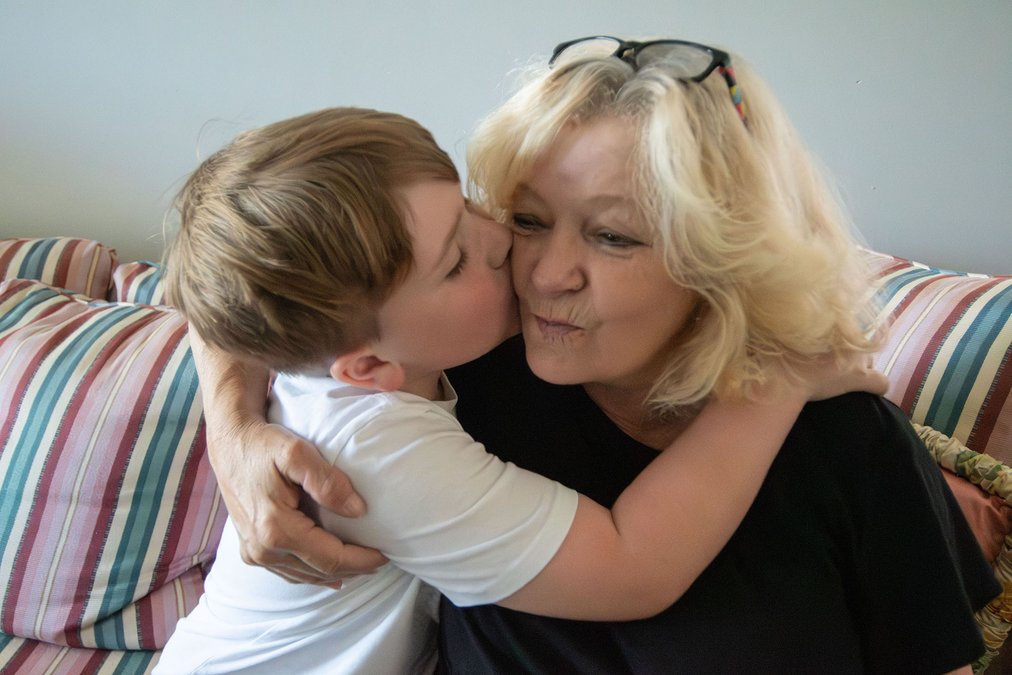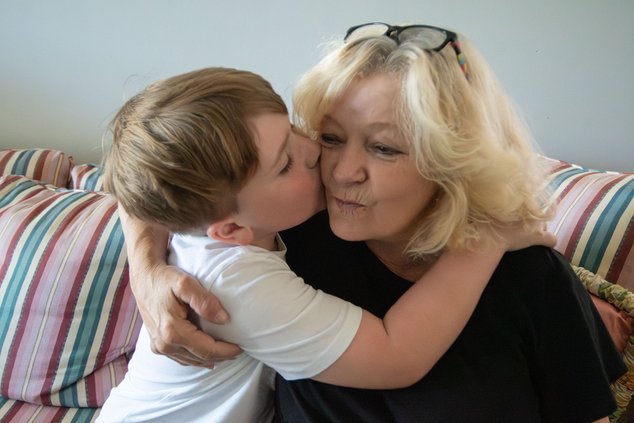Ten years ago, Teresa Stubbs’ husband shot and killed his best friend during an argument. The fallout from that incident cost Stubbs her home, land, “basically everything,” she said.
About two years ago, with more and more piling on, Stubbs found herself living in the back of an old camper in Leefield with her 6-year-old grandson, Avery Mock, in the backyard of a friend.
“I felt hopeless,” Stubbs said. “All I wanted to do was take care of Avery.”
Now, two years later, Stubbs and Avery are living in a two-story duplex near the Forest Heights Country Club area with a chance to regain some normalcy and begin building a future.
The break for Stubbs and her grandson came about thanks to a Rural Homeless Initiative grant from the U.S. Department of Housing and Urban Development (HUD). The grant was applied for and earned by the Union Mission in Savannah and it is being administered locally through the Open Hearts Community Mission homeless shelter.
“Teresa had some terrible things happen that caught her up in a situation out of her control,” said Delia Mobley, the executive director of the Open Hearts Mission. “Then she took Avery on. Then she suffered a stroke, which has caused neuropathy in her feet and severely weakened her whole left side.
“The grant program is working for Teresa and a number of other local families. We hope to expand it further.”
Union Mission, which provides support services to the homeless and other needy populations in the Savannah and southeast Georgia area, received approval last summer for the $2.5 million rural homeless grant that provides up to three years of direct assistance for long-term housing for previously homeless people.
Mobley said Union Mission president and CEO Mike Traynor called her and asked if there was enough need in Bulloch County that would meet the grant’s requirement of supplying a long-term housing option for a minimum of 20 families.
“I assured him we did have such a need and we got started last September,” Mobley said.
Peggy Brown, who was working as a case manager for clients of Union Mission in Savannah, came to Statesboro as part of the grant and began working with Mobley qualifying clients for the long-term program.

“Delia sends me an email or calls me that she may have a family that qualifies under the terms of the grant,” Brown said. “I come over and I do an intake, to make sure that they meet the minimum requirements. They have to have a mental health, substance abuse, physical disability or child with developmental disability.
“And then I build a case plan, a service plan that will address getting them to a self-sustaining life. I provide that case management and find appropriate housing for a family’s specific situation. I come out to the homes on a weekly basis, making contact with the clients to make sure that they are on a sustainable path.
“My case management focuses on meeting their needs and their goals, making referrals to different social service options. I advocate for them with everything from food stamps to finding child care.”
Identifying families
So far, Brown has identified and found apartments/duplexes for 11 families. The program, however, is running into issues with finding landlords willing to rent to perspective families.
And Mobley understands where their reluctance is coming from.

“I am a landlord myself,” she said. “And I had said to myself: I don't know if I ever want to participate in another program like this, because I just spent a lot of money repairing what a tenant had just torn up.”
But part of Brown’s job working through the grant program is finding responsible tenants and then ensuring they stay that way through the course of a lease.
“We're trying to change that behavior, that mindset and understand the importance of maintaining the house. But if a point comes where it's not working, then I will remove the family and try to relocate them or find another program for them.
“We're here to partner with landlords in the community because we work with them in our town. We have to put our faith in the apartment community that's already here and build it up.”
Brown makes weekly visits, more, if needed, to each of the apartments with families receiving assistance from the Riral Initiative Grant.
“I make sure the tenant is keeping the property in proper order and report to the landlord. If there are any issues – holes or other damage, accidental or otherwise – we try to repair it.”
Also, as part of the grant program, the signed leases for the apartments in the long-term program are actually with Union Mission, Brown said. Union Mission pays the landlord rent directly each month. The program requires tenants to pay 30% of their income each month as their share of the rent. That payment goes to Union Mission, which puts it back into the program to help keep all services available.
Teresa Stubbs and Avery
Stubbs was living in the camper in 2022 when the Department of Family and Children’s Service was ready to place Avery in foster care. Avery’s father is Stubbs’ son and he was battling addiction at that time.
“Avery was back and forth with me and his mother,” she said. “But she got arrested and so he was with me.”
She then gave birth to a drug-addicted child and DFACS was ready to step in when Stubbs said she would take responsibility for Avery.
“I didn’t want him to get in the system because who knows what would happen,” she said.
Stubbs got Avery enrolled at Brooklet Elementary and she said he was doing a little better.
“It still wasn’t good. I was running an extension cord to the house where the camper was. But we had no AC,” she said.
Stubbs said a friend of hers, Brenda Martin, told her about the Open Hearts Mission, which was founded by Mobley and a group of caring local residents in 2017. Martin was a former client at Open Hearts who is no longer homeless. Shortly after that, Mobley said she was contacted by Michael Waters, a deputy with the Bulloch County Sheriff’s Office.
“He texted me and told me he had a grandmother with her grandson living in terrible conditions,” Mobley said. “So, we turned our boardroom at the Mission into an additional family room.”
Shortly after arriving, Avery began receiving tutoring from a “retired fourth grade teacher – Miss Mary Emma Lewis,” Mobley said. Lewis still tutors him and his school performance has improved significantly. Come August 1, Avery will be a first-grader at Julia P. Bryant Elementary.
“He’s a little behind, but he’s thriving at that school,” Stubbs said.
After Stubbs and Avery got settled at Open Hearts, Mobley started thinking they would be a good family for the long-term-housing program.
“They were at the Mission a little before the program really started taking off,” she said. “We had been working with Teresa some and I mentioned to Peggy that I thought Teresa would be a good fit. When this unit (where they live now) became available, the more I was around Teresa and saw the way she kept her space at the Mission, I thought this would work well.”
Stubbs and Avery moved into the duplex on Feb. 1 and she now has legal custody of Avery.
“Whatever it takes to make sure Avery has a chance at doing better,” Stubbs said. “That’s what I’ll do.”
The grant will keep Stubbs in her new home through January 2025 and Brown said the parameters of the grant allow them to reapply for housing assistance in January and the following January, as well, for a total of three years of a stable housing situation.
Brown is confident Stubbs will qualify for the full three years.
“We consider everything when re-applying,” Brown said. “Her health and the fact that she is here and has done well in her current living situation. We don’t push anyone out. We’re here to be supportive and connect them with the support they need.”
Stubbs expects to receive approval soon for disability assistance and if Avery’s parents start working again, Avery will receive court-ordered financial support from them. Still, the effects from her stroke have left Stubbs unable to work, so she does worry about the future.
“I pray a lot,” she said. “A year ago, I didn’t know what would happen and how I was going to help Avery. But here we are. That’s given me hope.”
More landlords needed
While the grant specifies providing assistance to 20 families, Brown believes they would have enough in the grant for as many as 24 families. But, right now, they don’t have enough apartments or homes in which to place qualified families.
“(Stubbs’) apartment is immaculate,” Mobley said “Yes, that comes along with her being a responsible person, but it also comes along with the program’s structure and that extra support.
“If there are any landlords that may be on the fence about this program, I would just like for us to be able to sit and talk to them and explain the supervision these tenants have. They will get their rent paid guaranteed by the grant and Peggy’s regular visits will make sure their properties stay in great shape.”
Landlords, or anyone else interested in helping or learning more about the program, may contact Mobley at the Open Hearts Community Mission at (912) 623-2528 or at ohcmorg@gmail.com





